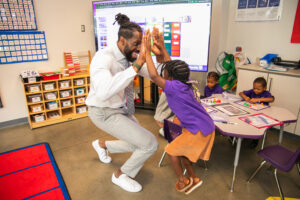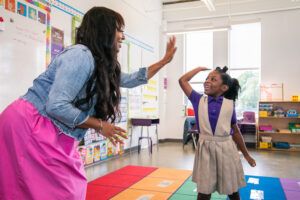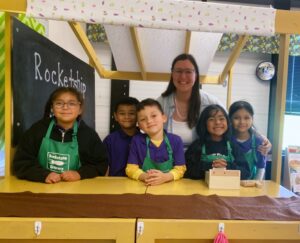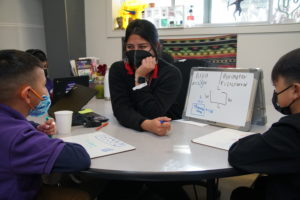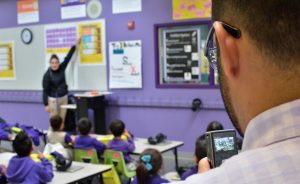
How Teachers Can Support Parents of Multilingual Students
Emma Volpe, Rocketship United Academy
It’s 2009. I’m sitting in my IB level Spanish class getting ready for our final presentations. I felt so confident in my work about musical instruments until my teacher looked at me when I finished and proceeded to share that I had mispronounced one word giving a completely unintentional meaning. I felt horrified and paralyzed – never wanting to push outside of my language comfort zone again. When it came time for college I registered for American Sign Language classes in order to avoid speaking out loud. That feeling of embarrassment lingered for nearly a decade.
I share this story because I bring myself back to that moment when I think about how that language barrier could feel for guardians of students who speak a different language from you. With end-of-year ‘Parent-Teacher Conferences’ coming up here are a few points of best practice in order to empower family members. At Rocketship Public Schools we believe these parent partnerships are an essential pillar to close the opportunity gap at hand.
Remind families they’ve given a gift
First and foremost, being multilingual is truly a gift. I missed my opportunity to learn another language as a child and it’s arguably one of my biggest regrets. It can feel overwhelming to families that their student may be behind grade level but in the long run, a student who is natured equally in their home, academic, and social language has an irreplaceable skill. A skill that will be something they carry with them all throughout their life. Remind families it is not a weakness of their student but a strength that they’ve given!
Be wary of subconscious assumptions
We all have subconscious bias all the time. Even something as simple as calling them ‘Parent-Teacher Conferences’ assumes that a biological parent is the person in attendance or the primary guardian of a student. Without realizing it I still let ‘mom and dad’ slip out when I ask students a question about their family – even being hyper-aware that not every family is comprised of a mom and dad. There’s also sometimes an assumption that if a family speaks a certain language that they also read and write in it. It’s okay that this happens! It’s part of being human but be cognizant and when you catch yourself making blanket assumptions just correct yourself or ask whoever you’re talking to what is best for them!
Give families practical ways to support their student’s language at home
There are so many ways for families to help their students with their language goals regardless if English is their primary language. They can have their student read a book (or even watch a tv show) and give a retell in their home language or engage in a dialogue about story elements of the text. It’s a great way to get creative but supporting strong reading and math skills can be done in any language and again strengthens that gift of being multilingual. As teachers, we can support with the vocabulary but the more practice students have with a skill and understand a concept the more confidence they’ll have to tackle it independently.
Best Practices with translators
Having a translator present can feel awkward at first. It can feel like a barrier but in reality a translator is an incredible multilingual human at work! They are there to help and follow these best practices to ease up the experience for yourself and families.
Speak in chunks
Keep your sentences short and pause after every two or three. This allows the translator to follow what you are saying and process more authentically.
Pay attention to jargon
Education is its own language. We speak using a lot of jargon that doesn’t always translate well. For example, at Rocketship we do the “MAP test,” which is a national proficiency computer exam but easily can translate to a test about maps. So think about how to phrase colloquialisms in a way that translates in a way that will have your message land as closely as intended. I consider myself a proficient English speaker, reader, writer, and listener but I would be incredibly lost reading a law or medical textbook. I would struggle to follow directions on how to build a house because I don’t have all the appropriate jargon in my toolkit. It could help to have simple phrases to help define specific terms to families.
Look at the family
It’s natural to look at a translator when speaking because you are directly speaking to them but best practice is to almost act like they are not there. Keep eye contact with family members or guardians. This keeps the family at the focus and the relationship between you and them. It’s a simple but effective tactic to build up trust! Don’t forget to smile too
Family conference days used to be anxiety-inducing and now have become some of my favorite days of the school year. I go back to that place when I embarrassed myself due to language to remember how it felt to have a high affective filter. It makes it difficult to focus and have a productive conversation. We need to ensure that we are following best practices to have that filter low for families who have the gift of knowing another language from you. It helps to build a foundation of trust and makes for stronger teamwork to support students. Let’s all work towards making family partnerships a more equitable experience for all!
Published on June 1, 2022
Read more stories about: Uncategorized.
In the Classroom
How to Foster a Growth Mindset in the Classroom
| April 10, 2025
Learn how to cultivate reflection, embrace challenges, and promote perseverance in yourself and in your students.
Read more ⟩How to Improve School Culture
Jeremiah Davis, Paraprofessional, Rocketship Dream Community Prep | March 3, 2025
Ready to ramp up moral at your school? Weave these nine celebrations into your school year!
Read more ⟩How Coaching in Schools Improves Outcomes
Rockesthip Public Schools | Feb 4, 2025
Learn how live coaching and weekly feedback sessions can help your teachers feel more supported year round!
Read more ⟩Parent Conference Tips for First Year Teachers
Jeremiah Davis, Paraprofessional, Rocketship Dream Community Prep | January 6, 2025
Looking for top parent conference tips? Prepare with advice from our educators.
Read more ⟩First Year Teacher? Here are Five Mistakes to Avoid.
Jeremiah Davis, Paraprofessional, Rocketship Dream Community Prep | November 1, 2024
See what mistakes most first year teachers make and how you can get ahead this school year with some simple tips from a fellow educator.
Read more ⟩3 Classroom Systems New Teachers Swear By
Rocketship Public Schools | Sept. 30, 2024
As a first year teacher, establishing a smooth and productive classroom environment can feel a tad overwhelming. Thankfully, these simple strategies can go a long way.
Read more ⟩How Co-Teacher Collaboration Can Benefit Your Classroom
Featuring Alejandra Chavez, Education Specialist at Rocketship Mosaic Elementary | June 10, 2024
Hear from Ms. Aly about how a small team of educators can make a big difference in student outcomes through thoughtful planning, focused collaboration, and personalized accommodations. Ms. Aly was one of our highest-performing educators in California for the 23-24 school year.
Read more ⟩How to Spark Joy in ESL Classrooms with a Multilingual Learning Clubhouse
Featuring Ms. Amy De La Rosa, Multilingual Specialist, Nashville Northeast Elementary | June 1, 2023
Listen in to an audio interview with Amy De La Rosa, a Multilingual Specialist who has worked as an educator for over 14 years and found an innovative way to help her students learn English in a more accelerated, playful way.
Read more ⟩Supporting Parents of Multilingual Students in Family/Teacher Conferences
Emma Volpe, Rocketship United Academy | June 1, 2022
Get thoughtful insight on how to create a more inclusive family-teacher conference environment.
Read more ⟩5 Ways to Strengthen Relationships in the Classroom
James Cross, Assistant Principal, Rocketship Nashville Northeast Elementary | February 20, 2022
A new age of education calls for a new level of connection. Here are some key tips to strengthen relationships in your classroom this school year.
Read more ⟩5 Ways School Leaders Can Coach and Support Teachers
Eesir Kaur, Director of Professional Development | October 15, 2020
Are you a school leader looking to coach your teachers more effectively? Here's what works for us.
Read more ⟩




